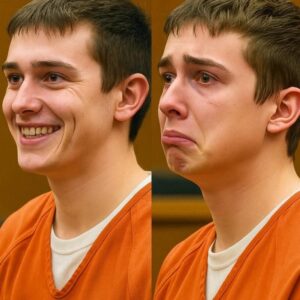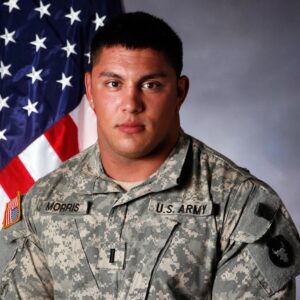The morning mist clung low to the ground, the kind of stubborn fog that lingered even after the sun had begun to rise. The Peterson farm, nestled against the base of the Blue Ridge Mountains, was still and quiet, save for the soft crunch of boots against frost-hardened grass. Seventy-year-old John Peterson moved slowly, the weight of the years in his knees, his back, and his silence. With each sunrise, the world grew quieter around him.
Beside him trotted Bella, his faithful mutt with patchy fur and wise, watchful eyes. She had been with him for nearly ten years, a loyal shadow to his solitary existence. But that morning, something was different. Bella’s ears perked, her body tensed, and she suddenly bolted toward the edge of the grove that bordered the east side of the farm.
“Bella? What in the world…” John muttered, picking up his pace. His breath came in visible puffs, his fingers numbed by the chill. As he pushed through the thin curtain of trees, a sound caught his ears—a soft, high-pitched wailing. A baby’s cry. No, not just one. Three distinct, desperate cries rose and fell in strange harmony.
John’s heart thudded in his chest. When he parted the branches of a low bush, he stumbled back a step. There, nestled on a rough bed of dry leaves and rags, were three babies—two girls and a boy. They were wrapped in tattered blankets, their cheeks flushed from the cold, their tiny fists clenched in protest.
He stared in disbelief.
“Dear Lord above,” he whispered, his voice breaking.
He knelt down, gently touching each of them, checking for signs of breath, of warmth. They were alive, but barely. With trembling hands, he scooped them up and wrapped them in his wool coat. That was when he noticed something odd.
Each baby wore a delicate silver chain, the kind you’d see in a boutique jewelry store, too fine for an infant. One charm was shaped like a crescent moon, another a golden sun, the last a shimmering star. And each had the same tiny initial engraved on the back: L.
As John gathered the infants close, something extraordinary happened. The cries stopped. All at once, they quieted, eyes blinking up at him as if they recognized him, or perhaps each other. He blinked back tears, stunned by the stillness.
His first instinct was panic—what did an old farmer know about babies? But Bella whined and nudged his knee, as if reminding him that inaction wasn’t an option.
Back at the farmhouse, John moved with more urgency than he had in years. He laid the babies near the wood-burning stove, bundling them in old flannel shirts. He hadn’t held anything so fragile since his own children were young, long before his wife passed, before the silence settled into the walls.
He found condensed milk, warmed it, and carefully spoon-fed the infants. They accepted the nourishment slowly, their hunger and fatigue evident in every tiny movement. Afterward, he laid them side by side, watching their small chests rise and fall.
That night, John couldn’t sleep. He kept checking on them, afraid their breath might stop, afraid they would vanish and he’d wake to find it all a dream. He finally called Marta, a retired nurse and one of the few people in town he still spoke to.
“Three babies?” she repeated, stunned. “John, are you sure? Alone?”
“I’m looking at them right now. I don’t know who they are. But someone left them here. And there was a note.”
He read it aloud: “Please love them enough for me.”
Marta arrived by sunrise, breathless and wide-eyed. She examined each baby with practiced hands, marveling at their odd jewelry and healthy lungs. “They’re underweight but strong,” she concluded. “They’ve been together too long to separate. And John… I think they were meant for you.”
The sheriff came next. Harvey Jenkins, stern and slow-talking, scratched his head after seeing the scene. No missing children matched the description. No cars had passed by recently, and the security camera at the only road into town hadn’t picked up a thing.
“Someone wanted them found,” Harvey said. “And someone trusted you to do the right thing.”
John wasn’t sure what that meant. But each day, he did what he could. He cleared out his late wife’s sewing room, filled it with secondhand cribs donated by the church, and named the babies Hope, Grace, and Ray.
Neighbors dropped by with diapers and casseroles. Adriana, his neighbor who had lost a child years ago, became a near-constant presence. She helped feed the babies, told them stories, rocked them to sleep. Her eyes lit up in a way John hadn’t seen since her loss.
A week later, the mailman delivered another letter—no return address. “They are all that remains of our broken family. Do not look for me. Take care of them.”
John read the letter aloud to Adriana, his hands shaking.
“Do you think the mother’s alive?” she asked.
“I don’t know,” he said, voice raw. “But she loved them. I can feel it.”
Over the following months, the three babies flourished. They smiled, cooed, reached for John with tiny hands that gripped his heart. The charms they wore remained untouched, a silent mystery.
When social services arrived, ready to begin the adoption process, Adriana made a quiet but firm request.
“Let me foster them,” she said. “They already know me. And John… he’s their family.”
The arrangement was approved. John became “Grandpa John,” a title he wore with unexpected pride. He visited daily, helped in the garden, sang lullabies. And every night before bed, Adriana would place the moon, sun, and star charms in a velvet-lined box, promising the children they would one day learn the story of how love brought them to a quiet farm and a man who had no idea he needed saving.
Years later, when Hope, Grace, and Ray learned the truth, they asked John why he chose to keep them.
He looked at them, eyes moist, voice steady. “Because someone asked me to love you enough. And I did.”
In a world often too fast, too cruel, one small act of compassion changed everything. And in that simple choice, John Peterson gave three lost children a beginning—and found his own second chance.





